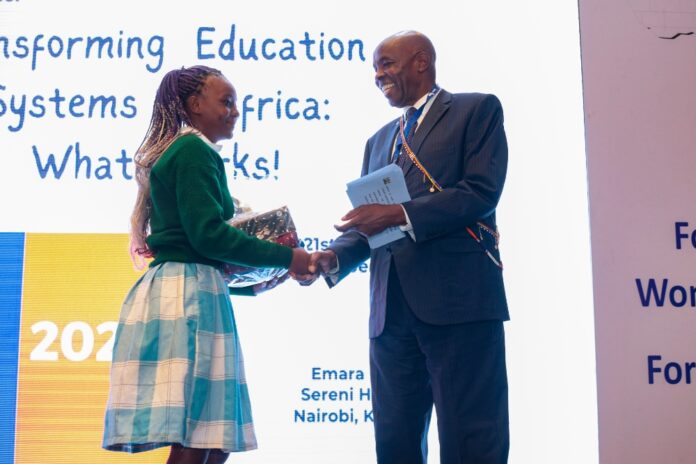The Forum for African Women Educationalists has today kicked off the highly anticipated two-day 3rd Triennial International Conference on Girls’ Education in Africa. The conference whose theme is ‘Transforming Education Systems: What Works?’ aims to reflect on advancing girls’ education through innovative solutions for emerging trends that affect access to quality education.
“At FAWE, we believe in the power of education to transform lives. Our mantra is to educate to elevate. This conference serves as a platform to collaborate, share insights, and advocate for the rights of every African girl to access quality education,” said Hon. Simone De Comarmond, Board Chairperson, FAWE Africa.
The conference has brought together regional and global participants from different sectors of education including Ministers of Education from Namibia, South Sudan, Siera Leone and Liberia, the keynote speaker being cabinet minister for Youth & Sports and Family Affairs Seychelles, representatives from regional educational bodies, Civil Society Organizations (CSOs), development partners, researchers, education and gender specialists from national, regional, sub-regional and international organizations.
Bizna Kenya partners with WYLDE International to promote SMEs
Speaking during the opening ceremony of the conference, Education Cabinet Secretary Hon. Ezekiel Machogu said,
“FAWE’s advocacy efforts are truly remarkable. FAWE’s investment in teachers has led to improvement in the quality of education in Africa. The government of Kenya has partnered with FAWE through the establishment of 160 Tuseme Clubs in schools in 20 counties. I am certain that this conference will contribute to the creation of innovative practices that will be of great benefit to the field of education.”
The conference will focus on paper presentations from education researchers and experts in response to the conference theme as well as the sub-themes which include: Enhanced gender equality in Education: The power of teaching and learning methodologies, Education and Technology: Lessons Learnt and the way forward, Technical Vocational Education Training (TVET) as an integral part to formal learning for girls, Addressing the increasing numbers of teenage pregnancies and ensuring access to education for all women and girls, Education: A catalyst to Girls and Young Women taking up Leadership positions.
“It is important for educationalists to meet, discuss and address barriers that lead to low school turnout for girls in Africa. This conference’s sub-themes are engineered to allow for learning and exchange and drawing innovative ways of increasing quality education in Africa. Panel discussions with prominent education experts will provide regional and global perspectives to challenges affecting girls’ education.”
Added Ms. Martha Muhwezi, Executive Director, FAWE Africa.
The Triennial International Girls Conference is a platform that FAWE uses to allow education stakeholders to discuss issues affecting girls’ education in Africa. The 1st conference was held in August 2017 under the theme “Towards Gender Equality in Education: Positioning Youth to Champion Africa’s Education Agenda” which conference enabled participants to share experiences and reflect on achievements of sustainability development goals (SDGs), Continental Education Strategy of Africa (CESA) 16 – 25, and Agenda 2063. The 2nd International Conference was unprecedentedly held online in November 2020. The theme of the conference was
“Towards Effective Approaches for girls’ Engagement and excellence: Preparing African Girls for the 21st Century Skills”.
The conference provided an opportunity for aesthetic experiences and artistic interventions to explore alternative ways of thinking about preparing African Girls for the 21st Century Skills and strengthening STEM uptake among girls and women.
FAWE effectively adapts to changing times while taking stock of the lessons learnt and best practices from our experiences. To ensure that education systems provide the necessary knowledge and skills to learners, regardless of their unique circumstances and specific contexts, there must be transformative action in all spheres of education systems









